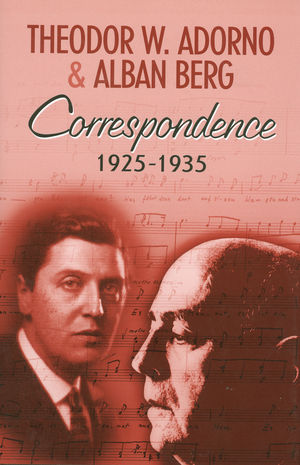Correspondence 1925-1935ISBN: 978-0-7456-2335-1
Hardcover
168 pages
December 2005, Polity
 |
||||||
Musical Times
"Major composers who befriend major philosophers, and
vice-versa, are hardly numerous in the history of Western culture.
Alban Berg's relationship with Theodor W. Adorno as teacher and
colleague ranks with that between Richard Wagner and Friedrich
Nietzsche, with the difference that Berg's and Adorno's genuine
affection for each other, and their magnificent insight into each
other’s work, remained constant to the end. Their
correspondence is one of the landmarks of the early twentieth
century and its music – a beacon of light in desperate
times."
John Deathridge, King’s College London
"Sensitively translated and skillfully edited, the Adorno-Berg
Correspondence represents scholarship eminently worthy of this
extraordinary collection of letters between two twentieth-century
intellectual-artistic giants. Adorno's composition lessons with
Berg lasted for only a few months, but the impact transformed his
understanding of modern music in particular and aesthetics in
general. Berg, in turn, respected his pupil’s abilities as a
composer, just as he clearly benefited, both intellectually and
emotionally, from young Adorno’s profound insight into his
master’s music. Though separated in age by nearly two
decades, the two men formed a relationship born of deep affection
and still deeper shared respect that lasted until Berg's untimely
and sudden death. The collected correspondence makes available for
the first time in English a body of texts that will add
significantly to our understanding of Adorno and Berg as well as
their breathtaking accomplishments."
Richard Leppert, University of Minnesota



